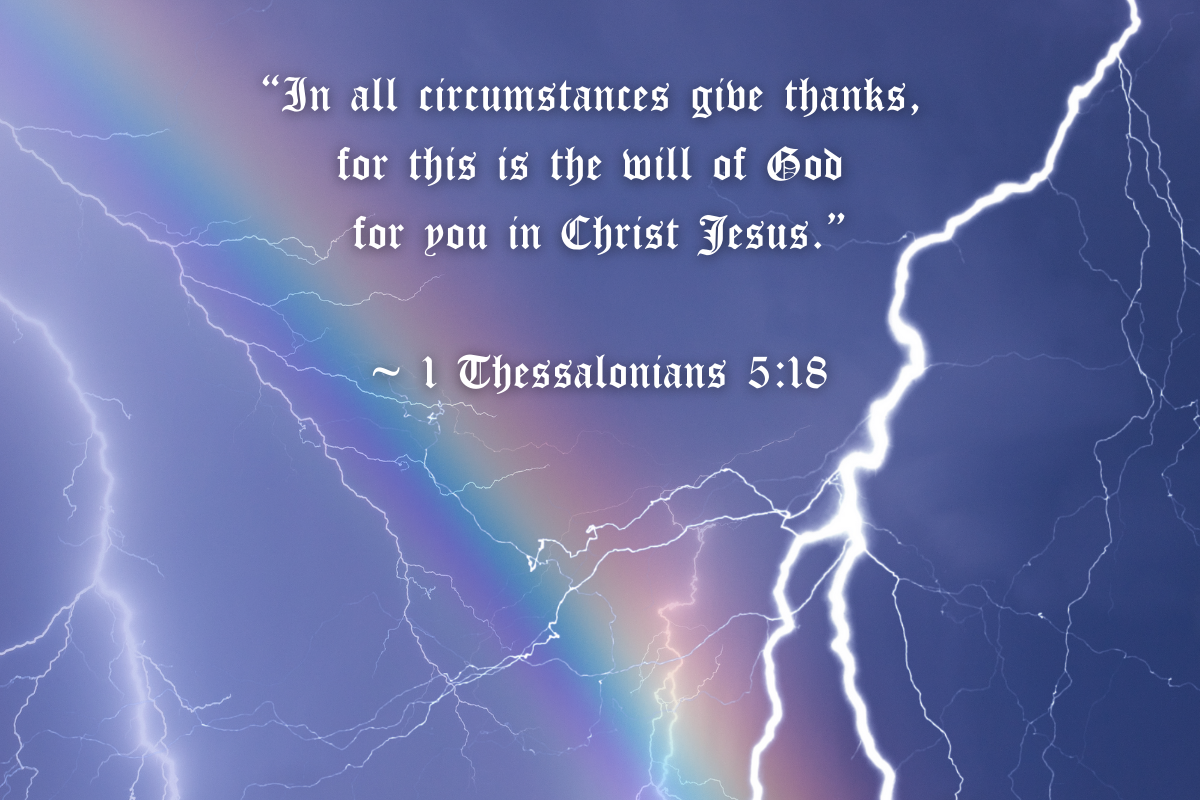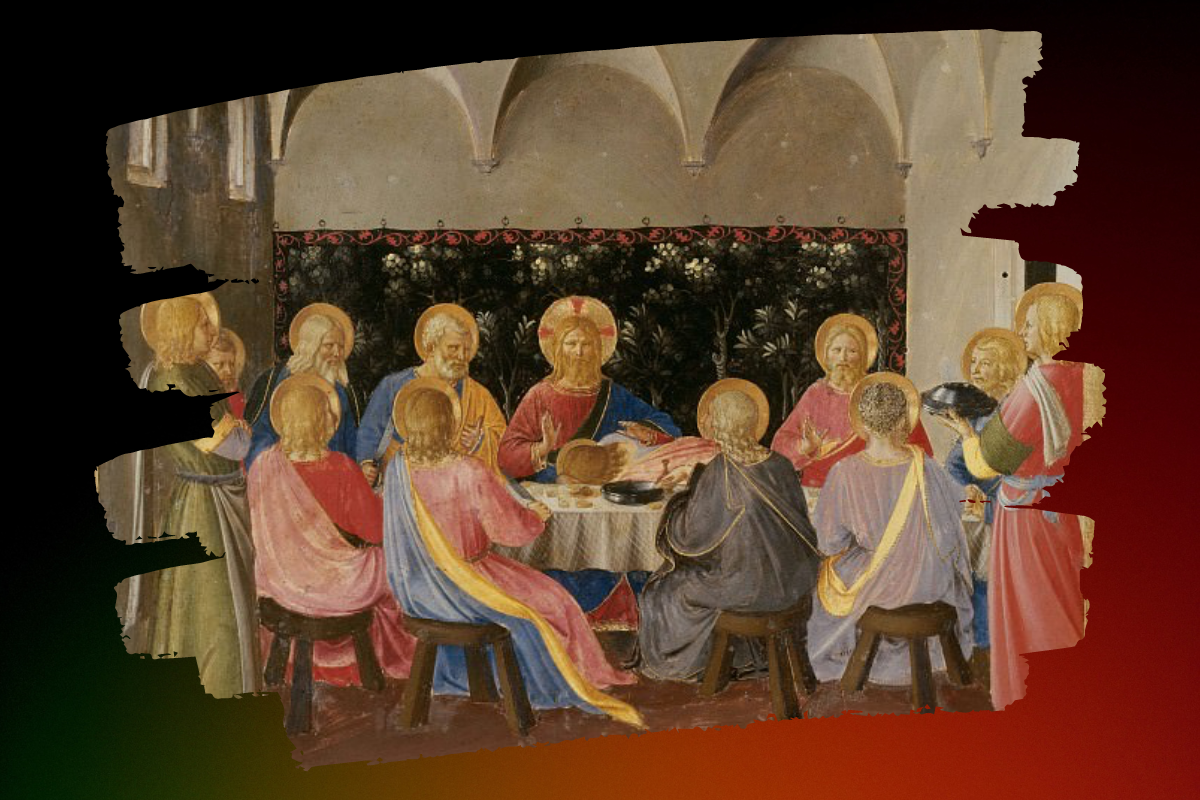Week Beginning July 31, 2022
Gratitude Facing Temptation and Sin
Our world is filled with shiny objects and alluring opportunities that distract us with desire. Each temptation we face forces us to make a choice that will bring us closer to or further away from God. When we consider our options in the light of God, we can make informed decisions that affirm our faith. “Blessed is the man who perseveres in temptation, for when he has been proved he will receive the crown of life that he promised to those who love him” (James 1:12).
When we take a moment to thank God for all that He is, all He has done, and all He promises to do, enticements pale in comparison. “Therefore, whoever thinks he is standing secure should take care not to fall. No trial has come to you but what is human. God is faithful and will not let you be tried beyond your strength; but with the trial he will also provide a way out, so that you may be able to bear it” (1 Corinthians 10:12-13). God gives us the wisdom and strength to overcome the urge to sin if we simply ask for His help.
Nonetheless, we occasionally fall into sin. When that time comes, we thank God for His enlightenment that our conduct is sinful, for giving us a conscience to pursue remediation, and for His strength to stop our misdeeds. By reminding us that we are not perfect, sin limits our self-righteous tendencies. While sinful behaviors attempt to obtain what we do not have, thankful practices express appreciation for what we do have. In that way, gratitude overcomes sin.
Because sin leads to spiritual death, we must repent promptly and seek forgiveness. We naturally express thanks when we are forgiven for our indiscretions. We are especially grateful to God for granting our restoration and reconciliation “for his mercy endures forever” (Psalm 136). Staying spiritually alive will prepare us to recognize temptation and resist evil. We remain open to receiving God’s mercy and grace.
This week, start viewing your options in terms of improving your relationship with God. When you are faced with things like gossip, judgements, and unseemly thoughts, try to draw closer to God. Keep your focus on gratitude for what you have rather than hunger for what you lack. Thank God for leading you through all of your trials. Have faith that the light of God outshines any darkness of evil in this world.
Week Beginning July 24, 2022
Gratitude in All Circumstances
Saint Paul teaches us to express gratitude in all circumstances: “In all circumstances give thanks, for this is the will of God for you in Christ Jesus” (1 Thessalonians 5:18). Whereas it seems fitting to thank God for our blessings, it seems illogical to thank God for our misfortunes. God is the source of all things good, so He naturally deserves our gratitude for the good. But why might we be thankful for evil? And why would we thank God for evil, knowing that He is not the author and source of it?
Upon closer inspection, we see that we are instructed to thank God in all circumstances, not necessarily for all circumstances. Although God does not create our struggles, He allows them to bring about a greater good. When we suffer something bad, it can become something good through God. “Do not fear: I am with you; do not be anxious: I am your God. I will strengthen you, I will help you, I will uphold you with my victorious right hand” (Isaiah 41:10). Times of adversity are opportunities for us to grow in faith. When we invite the Lord to help us, we change our mindset from feeling like we can’t to knowing that we can with God.
We learn the ways of God when we carry our crosses with Jesus. “Please let me know your ways so that, in knowing you, I may continue to find favor with you” (Exodus 33:13). Our character is conformed to the likeness of Christ when we endure our trials with his help. In that way, there is some truth to Friedrich Nietzsche’s expression that what does not kill us makes us stronger. In the words of Saint Paul: “I will rather boast most gladly of my weaknesses, in order that the power of Christ may dwell with me. Therefore, I am content with weaknesses, insults, hardships, persecutions, and constraints, for the sake of Christ; for when I am weak, then I am strong” (2 Corinthians 12:9-10).
Wonderous things are possible when we place our trust and faith in God. Expressing our heartfelt appreciation acknowledges God’s presence and orients our focus away from our selfish concerns. “For this momentary light affliction is producing for us an eternal weight of glory beyond all comparison, as we look not to what is seen but to what is unseen; for what is seen is transitory, but what is unseen is eternal” (2 Corinthians 4:17-18). Whatever hardships we face on this earth will not compare to the glory that is to come. “Amen, amen I say to you, unless a grain of wheat falls to the ground and dies, it remains just a grain of wheat; but if it dies, it produces much fruit” (John 12:24).
This week, consider how you can cultivate thankfulness as a disposition. Do you recognize when God gives you a special blessing? Do you remember to thank Him? Do you recall those special events the way you would celebrate a holiday? Do you keep yourself open to receive His grace?
Please also reflect on how you maintain your attitude of gratitude during difficult times. When you experience pain and loss, do you seek God’s assistance? After God helps you to achieve something great, do you maintain your appreciation despite setbacks? Do you thank Him for His steadfast love, His enduring grace, His comfort through the storm, His restorative solutions, His abundant generosity, who He is, and who He created you to be? When you feel you have nothing left to give, do you still give thanks?
Saint Paul summarizes why gratitude is deserved in good times and in bad times: “I know indeed how to live in humble circumstances; I know also how to live with abundance. In every circumstance and in all things I have learned the secret of being well fed and of going hungry, of living in abundance and of being in need. I have the strength for everything through him who empowers me” (Philippians 4:12-13).
Week Beginning July 17, 2022
Gratitude for Our Bounty
The act of giving thanks for our nourishment has been a universal tradition as long as food has been a necessity for life. It is fitting to take a moment before or after we eat to express gratitude to God for the sustenance provided to us, for the animals and plants sacrificed in the process, and for the people who contributed to the preparation of the meal. Before refrigeration and pasteurization, blessing food was also considered a method of purification. “You shall serve the Lord, your God; then he will bless your food and drink, and I will remove sickness from your midst” (Exodus 23:25).
When we say grace before a meal, we are imitating Jesus Christ. The Gospel teaches us that Jesus gave a blessing before breaking bread (Mark 14:22, Matthew 14:19, Matthew 15:36, Matthew 26:26–28, Luke 22:19, Luke 24:30, John 6:11). Pausing for prayer at mealtime allows us to take a moment to humble ourselves, thank God for His blessings, and acknowledge His providence. When we share that special time with our loved ones, we strengthen our bonds of fellowship and build unity through our communion with God and with each other.
Saint Paul expands the concept of saying grace before meals to include giving thanks for all of our bounty. “So whether you eat or drink, or whatever you do, do everything for the glory of God” (1 Corinthians 10:31). G. K. Chesterton concurs: “You say grace before meals. All right. But I say grace before the concert and the opera, and grace before the play and pantomime, and grace before I open a book, and grace before sketching, painting, swimming, fencing, boxing, walking, playing, dancing and grace before I dip the pen in the ink.”
It is too common to take our blessings for granted and to neglect thanking God. We become busy, distracted, and rushed. Our focus slips away from Our Creator. That is precisely the time to re-orient ourselves toward the Lord.
This week, challenge yourself to say a quiet prayer of thanksgiving every time you enjoy something God has shared with you. When you participate in communal meals, invite your fellow diners to join you in saying grace. This simple act can transform your ordinary meal into a celebration of gratitude for the food before you, the friends beside you, the love surrounding you, and the goodness of God Who is always with you.
Week Beginning July 10, 2022
Gratitude Morning and Night
Establish a routine to proclaim praise and thanksgiving when you rise and when you rest. “It is good to give thanks to the Lord, to sing praise to your name, Most High, to proclaim your love at daybreak, your faithfulness in the night” (Psalm 92:2-3).
The Venerable Fulton Sheen said, “There are two ways of waking up in the morning. One is to say, ‘Good morning, God,’ and the other is to say, ‘Good God, morning’!” Each morning is an opportunity to thank God for the gift of another day on earth and for all the wonderful possibilities that await us. By seeking God in the morning, we are better able to discern His direction for us and to establish our readiness to do His will throughout the day. When we offer our gratitude to God in the morning, we give Him our “first fruits” by reserving the first portion of the day for Him.
Welcoming God into our lives every morning sets us up for a joyful and peaceful day. “Have no anxiety at all, but in everything, by prayer and petition, with thanksgiving, make your requests known to God. Then the peace of God that surpasses all understanding will guard your hearts and minds in Christ Jesus” (Philippians 4:6-7).
As we prepare to retire for the evening, we also acknowledge God for our blessings. We offer thanksgiving for the good things that happen, we contemplate how we can better imitate Jesus Christ in the situations we encounter, and we endeavor to accept and learn from our trials. Recognizing humbly that we are merely servants of the Lord, we reward him with thanks before we reward ourselves with rest. We extend our gratitude to God, and we trust that He will protect us throughout the night.
This week, make an effort each morning and night to appreciate everything God gives to us. Consider waking up early to engage in reciting morning prayers, meditating, reading scripture, singing hymns, attending Mass, or simply offering heartfelt thanks. Continue the practice before you go to sleep. You can also reflect upon your day, examine your conscience, and make an act of contrition.
Embrace the words of Pope Saint John Paul II, “Remember the past with gratitude. Live the present with enthusiasm. Look forward to the future with confidence.”
Week Beginning July 3, 2022
Gratitude When We Praise God
When we pray, praise is fittingly accompanied by thanksgiving. “Therefore, our God, we give you thanks and we praise the majesty of your name” (1 Chronicles 29:13). While praise is the form of prayer which recognizes, lauds, and glorifies God for His sake, thanksgiving is the form of prayer which expresses our gratitude for what God has done.
In fact, the Greek word expressing thanks is at the center of our Christian worship. When Jesus instituted the Eucharist–derived from the Greek eucharistia meaning “thanksgiving”–he established it as an act of thanks. The two substances of bread and wine are also intended as symbols of gratitude. As foreshadowing to the covenant Jesus sealed with his flesh and blood on the night before his crucifixion, the Priest Melchizedek offered bread and wine to thank God the Creator when he bestowed blessings upon Abraham (Genesis 14:18-20).
Our entire Mass is a prayer of thanksgiving. In their document The Mystery of the Eucharist in the Life of the Church, the United States Conference of Catholic Bishops states: “To worship God on Sundays, then, is not the mere observance of a rule but the fulfillment of our identity, of who we are as members of the Body of Christ. Participation in the Mass is an act of love.”
Considering that Jesus Christ gave his entire body, blood, soul, and divinity to us, the just response is to offer ourselves in thanksgiving to him. Saint Peter Julian writes, “Belong entirely to God through love, entirely to your neighbor through a gracious charity, entirely to the divine Eucharist by the offering and sacrifice of your whole self.”
When you receive and adore the Most Blessed Sacrament, appreciate the tremendous privilege we have to join our thanks with Christ’s sacrificial offering and to unite in communion with God and with one another. Use those precious moments after you receive Holy Communion to revere Christ’s real presence in the Eucharist and to express your love and thanksgiving to him. Saint John Vianney describes, “When we leave the altar rails we are as happy as the Magi would have been if they had been able to carry off the Infant Jesus.”
This week, share your gratitude every time you praise and petition God through prayer. Treat each and every Sunday, the Lord’s Day, like a holiday of thanksgiving. Rather than focusing on what you can get from attending Mass, focus on what you can give–specifically, your gratitude to God. Rejoice in the words we recite at our dismissal during the Easter season: “Thanks be to God, alleluia, alleluia!”





